The United Kingdom (UK) and European Union (EU) are finally reaching the ‘critical stage’ of Brexit trade talks. But what exactly does this all mean?
Well firstly the UK has indeed left the EU and did so on the 31st of January 2020. However, the UK and the EU have until the 31st of December 2020 to agree on a trade deal, as well as other key policy areas, such as fishing rights.
There are two key debates going on between the UK and EU, one being fishing rights, the other over business competition rules.
Fishing has been a long-standing issue heralded by Eurosceptics (now Brexiteers) since the creation of the Common Fisheries Policy (CFP), this enables all member states of the EU to use each other’s fishing waters. The common example used by those in support of Brexit, is that the CFP is taking away jobs from British fishermen and causing the decline in the fisheries industry in the UK. This is argued as the result of increased competition in ‘British waters’ from non-UK EU fishermen.
This contentious issue led to Greenland leaving the European Economic Community (prior title of the EU) back in 1985 after a referendum. For the UK today and its Conservative government, taking back sovereignty and regaining the 60 per cent of fish in British waters that are caught by other EU members boats is of importance to please Brexiteers and the working class. Even though the UK fishing industry was reported as the third highest by tonnage (amount caught) in the 2019 fishery statistics report by the EU, only behind Spain in first place, and Denmark in second place.
As for the other issue on business competition rules, this mostly comes down to a debate over the so-called ‘level playing field’, these are a set of rules and regulations to ensure businesses do not have an unfair advantage over one another, especially businesses in one EU member state over another EU member state. The Conservative government will of course wish to break out of these restrictions, to allow UK businesses to operate without the competition rules restrictions. However, this would also mean leaving behind EU protections for workers’ rights, and rules on environmental regulations and state aid for businesses. This could leave workers without crucial protections and businesses with the freedom to go back on environmentally friendly policies.
So, does this mean the UK is not going to get a trade deal with the EU?
Not necessarily, although the clock is ticking with the 31st of December getting ever closer, the UK and the EU still have time to find a compromise over these two policy areas. The UK government has also put out an ‘olive branch’ to the EU, in stating that it will drop the controversial elements of the Internal Market Bill if a trade deal is signed. The Internal Market Bill being a bill opposed by the House of Lords and the EU, due to elements of it that would break international law by overriding the withdrawal agreement with the EU.
Ultimately, a trade deal is in the best interest of both the UK and the EU. The EU is a massive and local market that the UK has been intertwined with since joining the EEC almost 50 years ago in 1973. While the UK is currently the 6th largest economy, with EU members Germany ranking above at 4th place, and France just behind in 7th place. This means that the UK also has its own leverage, alongside possible trade deals with the USA and ‘CANZUK’ (Canada, Australia, New Zealand, and the United Kingdom). Hopefully, compromise will be achieved, and a trade deal signed, as gracefully leaving the EU with a trade deal sounds a lot better than crashing out and potentially breaking international law.
Cameron Thomas
Image source: Pixabay

